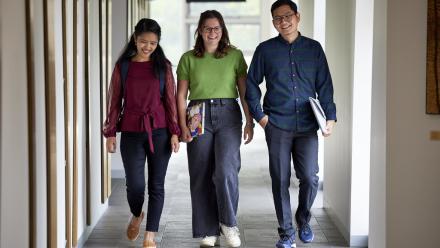Making change through music
Three recent projects from the ANU School of Music are bringing about a process of change at an important time in building relations between our First Peoples and the ANU.
Three recent projects from the ANU School of Music are bringing about a process of change at an important time in building relations between our First Peoples and the ANU.
Professor Kim Cunio, Head of the School of Music, has supported Indigenous staff to introduce Yil Lull, a free Indigenous recording studio, Ngarra-burria, a free Indigenous composers’ program and other significant Indigenous leadership initiatives.
These projects are examples of this year’s National Reconciliation Week (NRW) theme, Be Brave. Make Change, in action within our campus community.
This year’s theme asks all Australians to make change beginning with brave actions in their daily lives – where they live, work, play and socialise.
The Yil Lull Studio
The Yil Lull Studio, which opened in 2021, is an Indigenous-led recording studio at the School of Music.
“Yil Lull is the centrepiece of the School of Music's Grand Challenge project, a project that is both local and national, that serves the local Indigenous community as well as making music for Indigenous musicians.”
As an essential part of the Grand Challenge project, the Yil Lull Studio reflects the premise that Australia’s national university has an inherent responsibility to support Indigenous health and wellbeing through the making of music both on the ANU campus and on country.
The Ngarra-burria composers’ program
Established in 2017, and led by Associate Professor Chris Sainsbury, Professor Cunio says the Ngarra-burria composers’ program is beginning to change the landscape of classical music in Australia. In May this year, the Program was globally recognised for its innovation through a Classical:NEXT2022 Innovation Award.
“Prior to this program white composers would write Indigenous inspired music in a manner that would horrify other areas of scholarship or artistic practice. Chris and the program have changed this in this country,” Professor Cunio says.
The Ngarra-burria composers’ program aims to develop and support Indigenous composers working in scored music formats and new music styles. The aims of this initiative include composer development, making industry connections, increasing visibility, and exploring new expressions of culture.
Indigenous leadership and representation
Initiated in 2018, Indigenous leadership at the School of Music has led to increased Indigenous representation within its faculty, positions of leadership and Community Advisory Board. The initiative has also led to the formation of an Indigenous Advisory Board. As of 2022, the Music School is proud to have six Indigenous staff members.
“Around 25 per cent of our academic affiliations are Indigenous or with non-Indigenous researchers who work within Indigenous led co-design, meaning that the on-the-ground sense of Indigenous academic leadership is always there,” Professor Cunio says.
This year, the School is considering how things might change in their larger academy through transferring power to Indigenous people and prioritising diverse voices.
As a crucial first step, the School acknowledges how music schools at the tertiary level are considered bastions of privilege, steeped in western canonic thought and artistic practice, that require years of expensive tuition. Indigenous and diverse knowledge practices are too easily missed. However, according to Professor Cunio, the School of Music excels by facilitating shared practices with First Nations people and diverse musicians.
“In our music school there are initiatives that respond to gender discrimination and embrace multiculturalism, but we must first start and finish with First Nations business,” Professor Cunio says.
Other stories you might like to read
Page Owner: ANU Communications & Engagement
